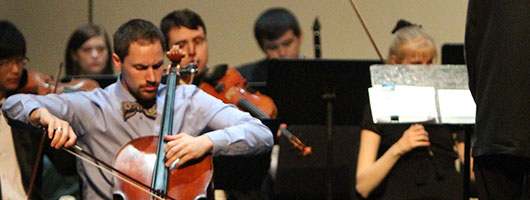 Pictured | Kendrick Morris | Music Performance | Elkhart, Indiana (hometown)
Pictured | Kendrick Morris | Music Performance | Elkhart, Indiana (hometown)
Master of Music in Composition
Curriculum Requirements (37 cr.)
The Master of Music in Composition curriculum is 37 credit hours total, not counting remedial music nor English courses.
All courses are 3 credit hours, unless otherwise noted.
Applied Music Courses (12 cr.)
- MUS-K 910 Composition Graduate Majors (3-3-3-3 cr.)
Composition applied instruction for four semesters - MUS-I 711 Masters Recital (0 cr.)
- One required outreach activity
With the approval of the graduate music faculty, a student may substitute a formal thesis, including an oral defense, for MUS-I 711 Masters Recital.
Core Music Courses (16 cr.)
- MUS-G 571 Master’s Advanced Orchestral Conducting
- MUS-I 503 Graduate Residency (4 semesters, 1 credit each)
- MUS-K 505 Projects in Electronic Music I
- MUS-M 530 Contemporary Music
(by recommendation of the advisor, another course may be substituted if this course was taken in the undergraduate degree.) - MUS-M 539 Introduction to Music Bibliography
Electives (6 cr.)
- BUS-M 301 Introduction to Marketing Management
No pre-requisites subject to approval of the Marketing Department. Other marketing classes as approved by advisor. - One additional elective (students may substitute courses at the 300– or 400–level as a graduate elective if approved by the Coordinator of Graduate Studies
Supporting Course(3 cr.)
- MUS-U 530 Seminar on Current Topics in Music Studies
Keyboard Proficiency
- MUS-P 515 (pending approval)
The keyboard examination is given at the end of each semester. Students who fail the examination must register in piano until the requirement is met. - Designed to ensure the student’s ability to use the piano as a tool within the framework of professional activities, the requirements vary according to level and area of music study. Students are to discuss specific requirements with their music advisors. Other examinations pertaining to specific degrees may be required as appropriate.
Final Writing Project
The student must complete a final writing project prior to the graduate recital. This project may take one of three forms: a thesis, extended program notes, or a performance-lecture. Students must present a proposal for their project by October 1 for completion in the spring semester and by March 1 for completion in the fall semester. Proposals should include the student’s name, degree program, a working title for the project, a 1-2 page single-spaced narrative providing background and significance of the project, and the semester in which the project will be completed. An additional MUS-I 711 Masters Recital may be substituted for the final project.
Master's Thesis
The master’s thesis is an extended research paper on a subject in music history or music theory chosen in consultation with and under the direction of a member of the academic faculty. The thesis must present an original idea and argument that is supported by extensive research in a document generally 50-75 pages in length.
Extended Program Notes
With this option, the student will prepare extended, comprehensive program notes that address the repertoire chosen for the student’s graduate recital. The notes must be based on substantive research in order to provide contextualization and analysis for each piece on the program. This project has two parts: extended program notes for review by the advisor (approximately 15 pages) and condensed program notes for printing in the recital program (approximately 5 pages).
Lecture–Recital
The student will prepare a 45-60 minute performance lecture that will be given immediately before the recital program. During the lecture, the student should provide the audience with historical contextualization and analysis of the pieces to be performed and demonstrate musical examples where appropriate.
Graduate Qualifying Examinations
Students must pass final examinations in music history, theory, and major area before the graduate recital. A student may attempt the examinations at any time during the degree program but must successfully complete each segment within a maximum of two attempts or be dismissed from the program.
- Each oral examination will be about 50 minutes.
- There will be a committee of three faculty members —including the studio teacher—and at least one academic faculty member.
- Two questions will be asked four weeks prior to the oral examination. One question will relate specifically to the area of study, and one question will relate to the final writing project, with a focus on music history and music theory. The student will prepare a 15 minute answer for each question, with additional time allotted for follow-up.
Sample question | Composers often engage with political and social issues through their music. Choose two pieces, one choral and one symphonic, by two different American composers and compare and contrast the ways in which each addresses a specific contemporary problem. Be prepared to discuss and cite relevant scholarly literature.